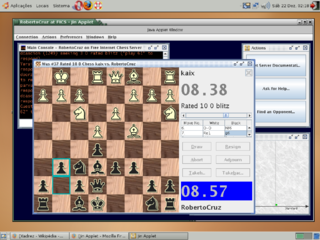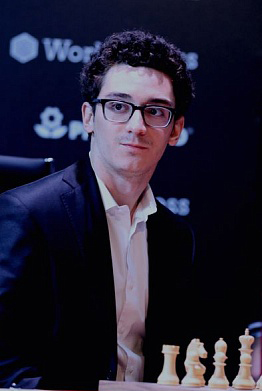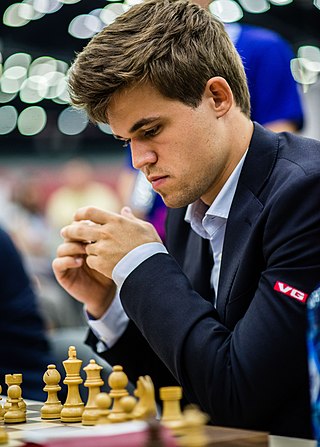
Chess is a board game for two players, called White and Black, each controlling an army of chess pieces, with the objective to checkmate the opponent's king. It is sometimes called international chess or Western chess to distinguish it from related games such as xiangqi and shogi. The recorded history of chess goes back at least to the emergence of a similar game, chaturanga, in seventh-century India. The rules of chess as they are known today emerged in Europe at the end of the 15th century, with standardization and universal acceptance by the end of the 19th century. Today, chess is one of the world's most popular games, and is played by millions of people worldwide.

The International Chess Federation or World Chess Federation, commonly referred to by its French acronym FIDE, is an international organization based in Switzerland that connects the various national chess federations and acts as the governing body of international chess competition. FIDE was founded in Paris, France, on July 20, 1924. Its motto is Gens una sumus, Latin for 'We are one Family'. In 1999, FIDE was recognized by the International Olympic Committee (IOC). As of December 21, 2023, there are 201 member federations of FIDE.
Grandmaster (GM) is a title awarded to chess players by the world chess organization FIDE. Apart from World Champion, Grandmaster is the highest title a chess player can attain. Once achieved, the title is held for life, though exceptionally the title can be revoked for cheating.

The Internet Chess Club (ICC) is a commercial Internet chess server devoted to the play and discussion of chess and chess variants. ICC had over 30,000 subscribing members in 2005. It was the first Internet chess server and was the largest pay to play chess server in 2005.
This glossary of chess explains commonly used terms in chess, in alphabetical order. Some of these terms have their own pages, like fork and pin. For a list of unorthodox chess pieces, see Fairy chess piece; for a list of terms specific to chess problems, see Glossary of chess problems; for a list of named opening lines, see List of chess openings; for a list of chess-related games, see List of chess variants; for a list of terms general to board games, see Glossary of board games.

Correspondence chess is chess played by various forms of long-distance correspondence, traditionally through the postal system. Today it is usually played through a correspondence chess server, a public internet chess forum, or email. Less common methods that have been employed include fax, homing pigeon and phone. It is in contrast to over-the-board (OTB) chess, where the players sit at a chessboard at the same time, or play each other in real time via the internet.

The United States Chess Federation is the governing body for chess competition in the United States and represents the U.S. in FIDE, the World Chess Federation. US Chess administers the official national rating system, awards national titles, sanctions over twenty national championships annually, and publishes two magazines: Chess Life and Chess Life for Kids. The USCF was founded and incorporated in Illinois in 1939, from the merger of two older chess organizations. It is a 501(c)(3) non-profit organization headquartered in St. Louis, Missouri. Its membership as of 2020 as COVID hit was 97,000; as of 2024 the membership was 112,000.

The Free Internet Chess Server (FICS) is a volunteer-run Internet chess server. It was organised as a free alternative to the Internet Chess Club (ICC), after that site began charging for membership.

Timur Gareyev is an Uzbekistani and American chess grandmaster.

Benjamin Philip Finegold is an American chess grandmaster and YouTuber/Twitch streamer. He had previously been nicknamed the "strongest International Master in the United States" until receiving his Grandmaster (GM) title in 2009.
The Australian Chess Federation (ACF) is dedicated to promoting the game of chess in Australia, and is a member of FIDE, the World Chess Federation.
The Fiji Chess Federation coordinates chess tournaments in Fiji and is affiliated to FIDE.
Cheating in chess is a deliberate violation of the rules of chess or other behaviour that is intended to give an unfair advantage to a player or team. Cheating can occur in many forms and can take place before, during, or after a game. Commonly cited instances of cheating include: collusion with spectators or other players, use of chess engines during play, rating manipulation, and violations of the touch-move rule. Many suspiciously motivated practices are not comprehensively covered by the rules of chess.

Fabiano Luigi Caruana is an Italian and American chess grandmaster who is the reigning three-time United States Chess Champion. With a peak rating of 2844, Caruana is the third-highest-rated player in history.

A chess title is a title regulated by a chess governing body and bestowed upon players based on their performance and rank. Such titles are usually granted for life. The international chess governing body FIDE grants several titles, the most prestigious of which is Grandmaster; many national chess federations also grant titles such as "National Master". More broadly, the term "master" can refer to any highly skilled chess player.

Ylon Schwartz is a chess master and professional poker player from Brooklyn, New York, and a fourth-place finisher in the $10,000 World Championship No Limit Hold'em Main Event of the 2008 World Series of Poker (WSOP), played on November 9, 2008. Prior to the Main Event, Schwartz had 11 career WSOP cashes. He is also a World Series of Poker bracelet winner. He used to play poker professionally online under the screen name "TenthPlanet".

A chess tournament is a series of chess games played competitively to determine a winning individual or team. Since the first international chess tournament in London, 1851, chess tournaments have become the standard form of chess competition among serious players.
A chess rating system is a system used in chess to estimate the strength of a player, based on their performance versus other players. They are used by organizations such as FIDE, the US Chess Federation, International Correspondence Chess Federation, and the English Chess Federation. Most of the systems are used to recalculate ratings after a tournament or match but some are used to recalculate ratings after individual games. Popular online chess sites such as chess.com, Lichess, and Internet Chess Club also implement rating systems. In almost all systems, a higher number indicates a stronger player. In general, players' ratings go up if they perform better than expected and down if they perform worse than expected. The magnitude of the change depends on the rating of their opponents. The Elo rating system is currently the most widely used. The Elo-like ratings systems have been adopted in many other contexts, such as other games like Go, in online competitive gaming, and in dating apps.

FIDE titles are awarded by the international chess governing body FIDE for outstanding performance. The highest such title is Grandmaster (GM). Titles generally require a combination of Elo rating and norms. Once awarded, titles are held for life except in cases of fraud or cheating. Open titles may be earned by all players, while women's titles are restricted to female players. Many strong female players hold both open and women's titles. FIDE also awards titles for arbiters, organizers and trainers. Titles for correspondence chess, chess problem composition and chess problem solving are no longer administered by FIDE.

The following outline is provided as an overview of and topical guide to chess:














